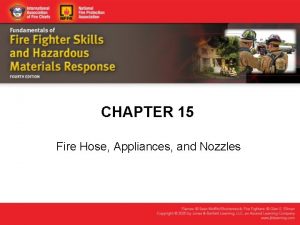Forget the fire hose firefighters of the future




![• "Essentially, the [electrical field] separates the region that's hot and burning from • "Essentially, the [electrical field] separates the region that's hot and burning from](https://slidetodoc.com/presentation_image_h2/4b7d2d3b86d07478203401a31c58efd1/image-5.jpg)

- Slides: 6

Forget the fire hose. . . firefighters of the future may be putting out fires with a wave of an electric wand Jon Henley guardian. co. uk, Tuesday 29 March 2011 14. 59 EDT

• Fire extinguishers may soon be a thing of the past: wave a magic electric wand at a flame and you can snuff it out in milliseconds, according to Dr Ludevico Cademartiri. • In a paper presented to the American Chemical Society, Cademartiri's Harvard University team reported that they had been able to extinguish an 18 in flame merely by using an electrified metal wire.

• The beam of electricity came from a 600 watt amplifier, about the same power as a car stereo system; so, the firefighter of the future would only need an ultra-portable power pack and wire rather than a cumbersome hose and large quantities of water or foam.

• How does it work, though? It's based on the observation made some 200 years ago that electricity can change the shape of flames. • Previous experiments involved direct current, or DC. But Cademartiri's team used oscillating AC voltage, and found that the effects were "completely different": the electrical field charges the carbon particles (or soot) generated by the fire, creating an organized "flow" of charged particles inside the flame that literally pushes the flame away from the fuel source, putting it out.
![Essentially the electrical field separates the region thats hot and burning from • "Essentially, the [electrical field] separates the region that's hot and burning from](https://slidetodoc.com/presentation_image_h2/4b7d2d3b86d07478203401a31c58efd1/image-5.jpg)
• "Essentially, the [electrical field] separates the region that's hot and burning from the unburnt fuel, so that fuel will not continue to burn, " says Kyle Bishop, a researcher who worked with the team. • Cademartiri thinks the method could be a more sophisticated way of putting out fires "than just throwing water at them". And he and his colleagues are looking at applications beyond firefighting: controlling flames at will in the combustion process could, for example, lead to far more efficient coal, oil and gas-fired energy production.

Questions • Based on the article, what do you think could be the potential benefits of this new technology? • What major drawbacks, if any, could this technology have? • If you were a firefighter, what questions/concerns would you have for the creators of this new technology?










